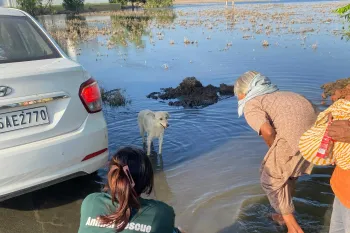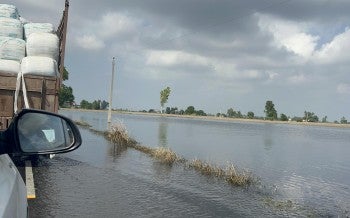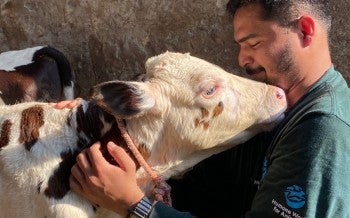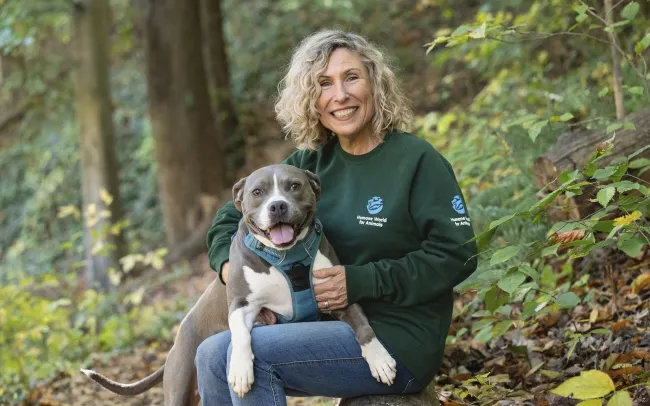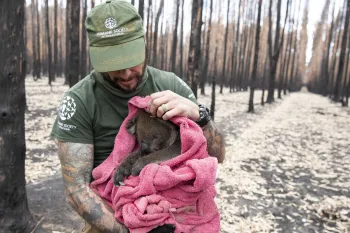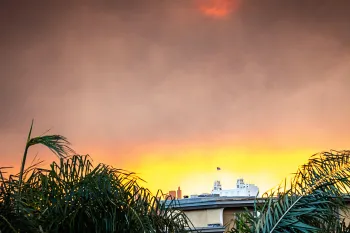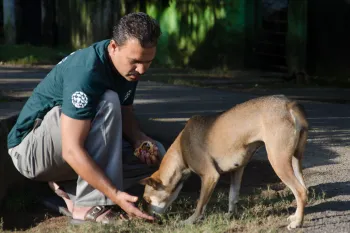In recent weeks, devastating monsoon floods have swept across large areas of India and Pakistan, destroying homes, displacing communities and leaving countless animals in urgent need of care.
Our disaster ethos is simple but powerful: Respond with compassion, work in partnership and build resilience for the future. That means mobilizing quickly to meet immediate needs such as food, water, shelter and veterinary care, while also investing in long-term solutions that leave communities stronger when the next disaster comes.
When I see images of acres and acres of land submerged in water after over three weeks of floods, I can only imagine how bad it must have been during the floods.
Several stories surfaced from the region that speak to how resilient and compassionate people can be in the face of tragedy. For example, our team in India encountered an elderly farmer and his family living with his animals by the side of the road. His three cows were starving and his family just barely surviving after their home and most of their belongings were damaged by the flood. But when we arrived at their house, situated in a remote village, they first offered our team water and asked how they were feeling. When they realized the team had come with feed for their animals, they immediately fed their animals, saying that they had not been receiving enough aid for them.
Indeed, the areas of our outreach have been some of the most overlooked regions in terms of flood relief. Disasters like these underscore why we at Humane World for Animals prepare, partner and respond in the ways we do.
In India, entire farming communities have been overwhelmed by the monsoon. With more than 1,400 villages inundated, 350,000 people displaced and over 5.7 million animals impacted, the devastation is hard to fathom. With floods comes the risk of starvation and diseases. When food supplies for vulnerable animals vanish, the survival of both animals and their caretakers hangs in the balance.
Humane World for Animals India has already cared for over 18,000 animals including dogs, goats, buffaloes and cows, providing them nutritious food and medicines and building temporary shelters.
Across the border in Pakistan, the flooding has also been severe, particularly in the provinces of Khyber Pakhtunkhwa and Punjab, where both people and animals are enduring massive losses.
With our partners at Lucky Animal Protection Shelter, we are funding two projects that expand capacity to provide emergency shelter, food and veterinary care for animals affected by the floods. The shelter is particularly at risk because it is situated near to the banks of the River Kabul, and we’re supporting LAPS to safeguard the organization’s animals and facility should more flooding occur.
Already, LAPS, working alongside a Pakistani university, has deployed to hard-hit rural areas, where they vaccinated and treated more than 1,500 animals. Over 2,000 doses of lifesaving vaccines against diseases that are transmitted through floodwaters have been administered to farm animals, alongside antibiotics, insecticides, vitamins and minerals. These measures have been crucial in preventing disease outbreaks and protecting the surviving animals that farming families depend on for food and income. Despite this progress, needs remain immense. Fodder, silage and hay are still urgently required to keep animals alive and to restore a measure of hope and stability for affected communities. We are committed to continuing to help however we can.
While response and relief are a key part of disaster management in the aftermath, we are building partnerships along the way to ensure communities are prepared for such disasters in future. As we continue this response, our greatest inspiration comes from the resilience of the communities and animals we serve.
Preparedness saves lives, and Humane World for Animals is committed not just to emergency relief, but to building the systems and capacity that will protect animals and communities long after the waters recede.
